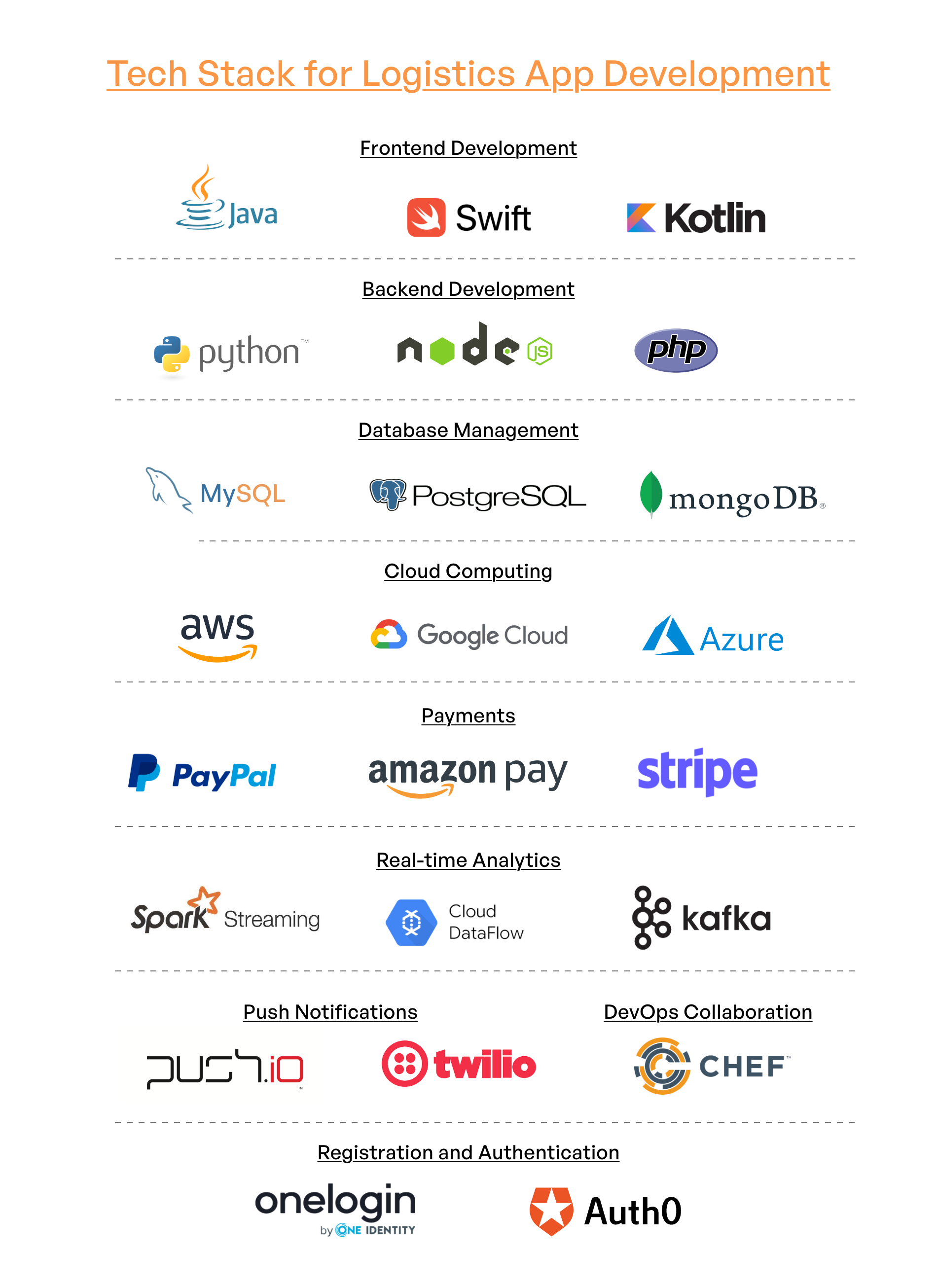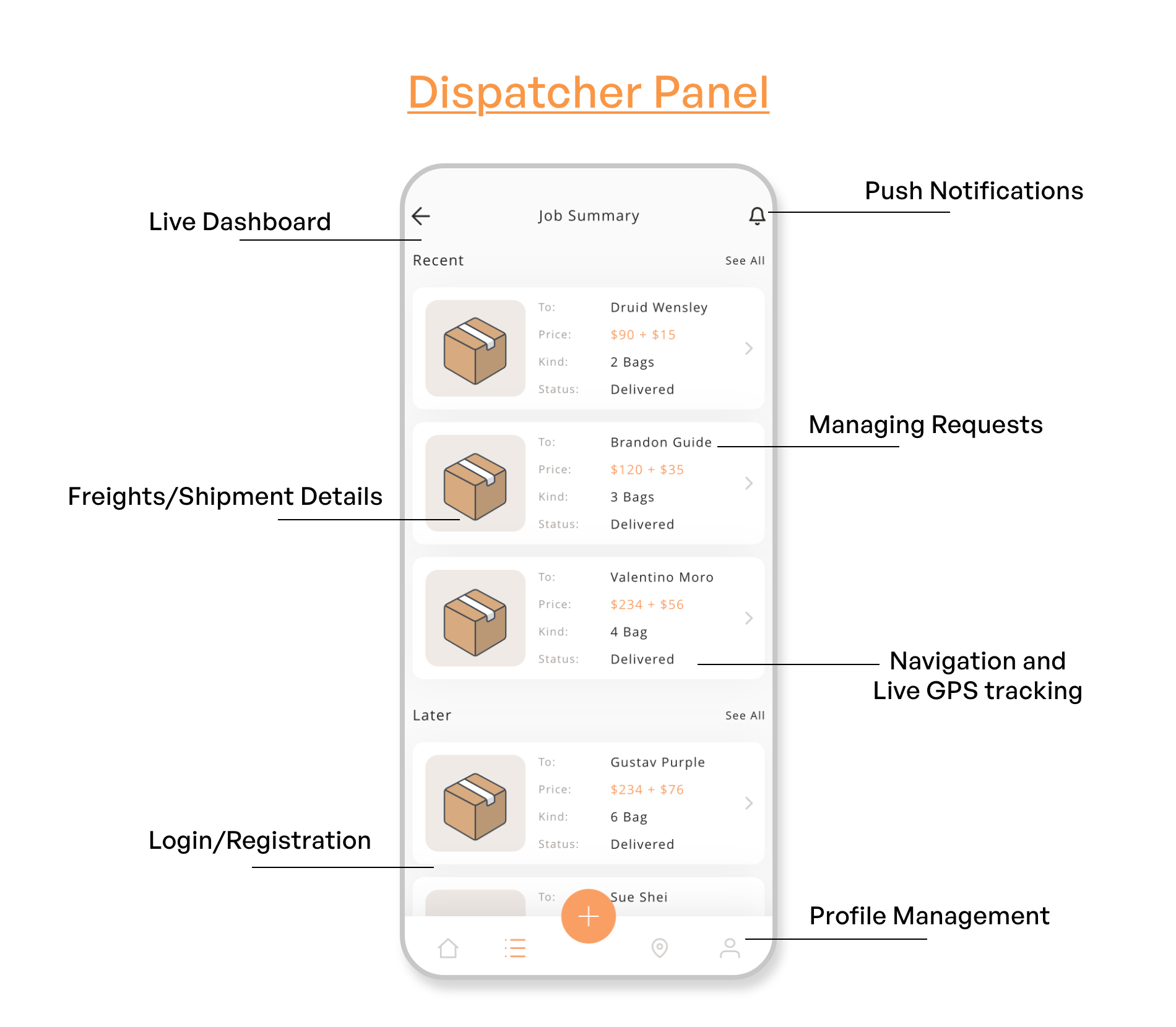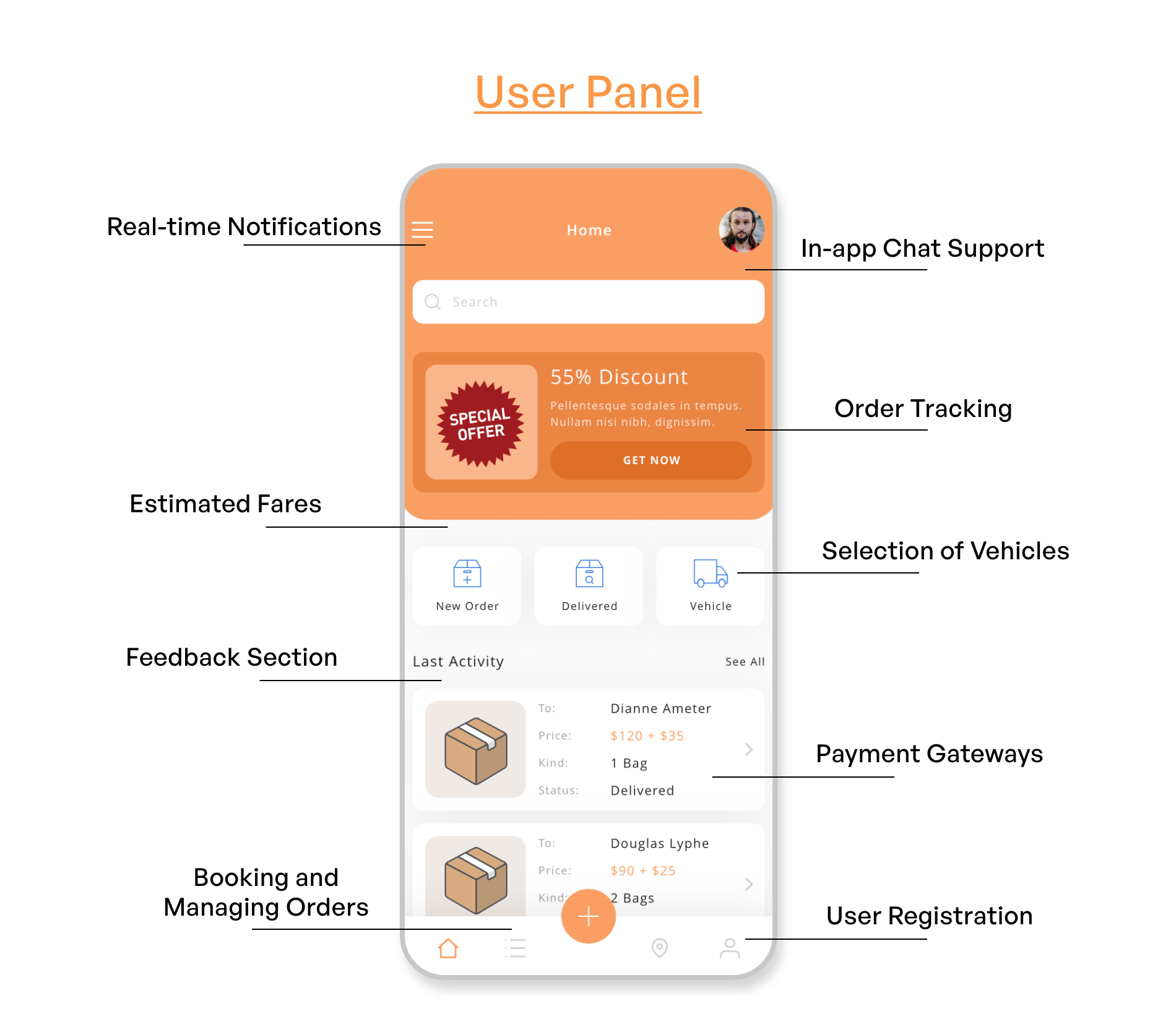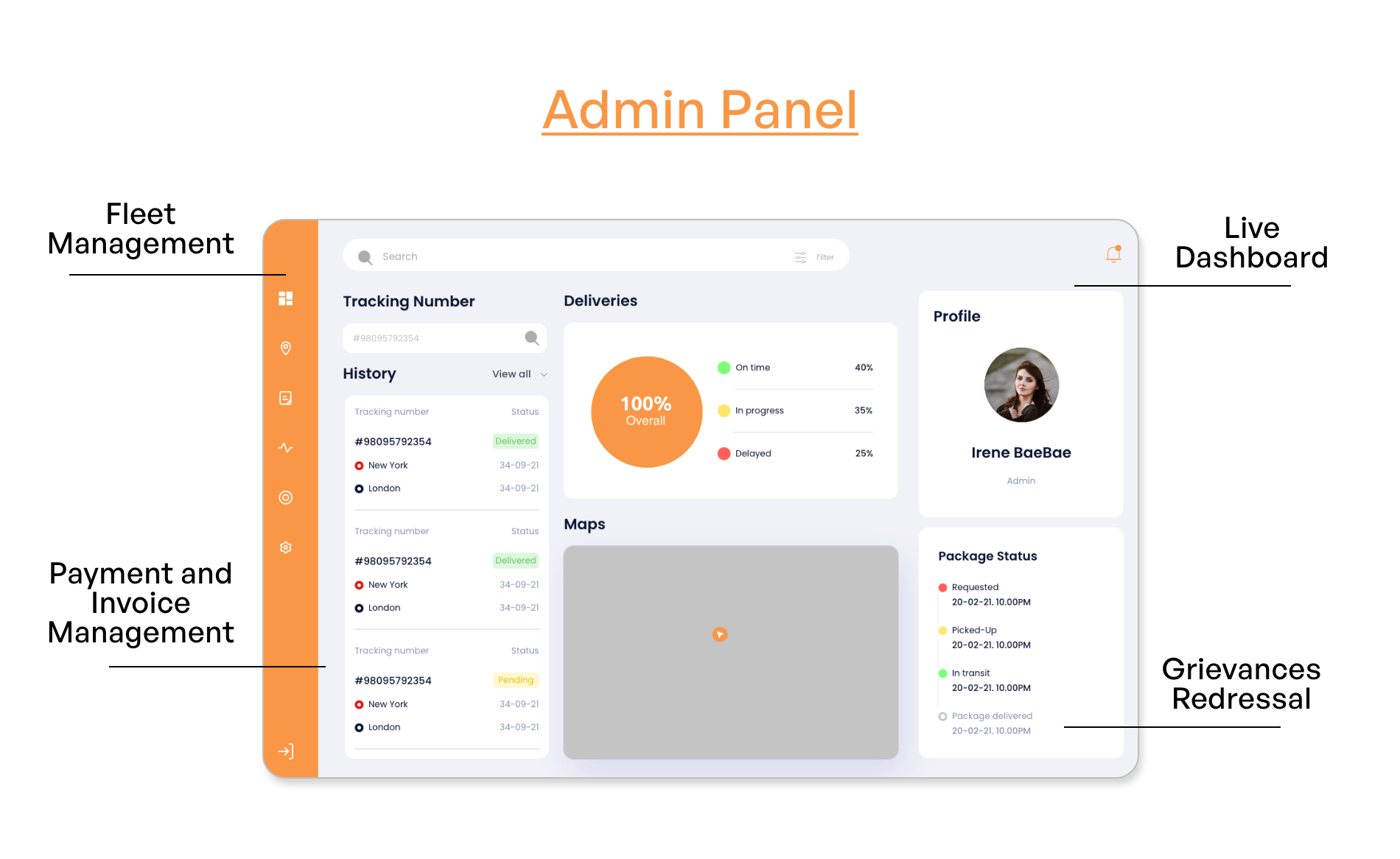The global logistics industry is advancing at an unstoppable pace, strengthening the international trading structure. In such a landscape, the right logistics development strategy can enhance your transportation business substantially.
Updated 23 October 2023

Director at Appventurez
Do you know that an average freight driver drives around 30% of their miles empty? It means that one could only leverage 70% of their total capacity. Well, this is something that happens with most companies using traditional logistics management systems.
Nonetheless, the trajectory of these statistics could have taken a different course had businesses embraced efficient digital logistics solutions for their freight operations, such as a logistics mobile application.
The evolution of logistics software has been instrumental in propelling the supply chain and transportation market forward. These applications have bestowed business owners with a heightened level of transparency in managing freight operations, dismantling obstacles that previously impeded the realization of seamless supply chain management.
It’s pivotal to recognize that each app serves distinct roles and functions. Understanding the specific type of logistics app that suits your business requirements and determining the optimal approach to create it is paramount. To navigate the intricacies of logistics app development, acquiring knowledge about the requisite technologies and considering other significant factors is essential. Seek guidance from a specialized logistics app development company like Appventurez for expert insights and solutions.
A logistics application is a comprehensive digital logistics delivery solution that helps businesses manage all their freight operations including fleet management, shipment tracking, vehicle maintenance, and routing.
Besides business owners, the on-demand platforms of these apps allow customers to book a shipment easily with their smartphone whenever needed. One of the best things about these applications is that they provide users with real-time updates about the shipments so that near-to-precision ETAs can be generated. Also, the integration of various advanced solutions into these apps can lead to digital transformation in the logistics industry.
The logistics sector has witnessed constant all-time growth in the past few years. In 2021, after the impact of the pandemic weakened a little, almost the entire industry switched back to in-office activities following the necessary guidelines. That’s the reason the logistics sector witnessed a growth of 2.7 trillion euros worldwide compared to the preceding year. However, consumers in most locations were still under lockdown, and that became one of the prominent reasons encouraging businesses to develop a logistics app.
Besides this, the incorporation of digital technologies, such as AI and ML in supply chain management, data analytics, cloud computing, and IoT-based business automation has also done wonders in this sector.
The logistics department of any organization is quite wide, encompassing different units such as transportation, warehousing, inventory, and fleet management – each one of them having its own needs. That’s why developing various types of logistics apps based on different functions becomes a feasible option. Below are some of the cherry-picked categories of major logistics apps.
Fleets play an important role in transferring goods from one place to another. In fact. logistics/trucking holds the largest market share in terms of the mode of transportation used for supply chain activities for the feasibility it provides to both businesses and consumers. In such a scenario, improper management of fleets can lead to a disruption in your entire logistics business.
In such cases, a fleet management solution can significantly help logistics business owners. With a fleet management application, you can easily record and manage data regarding vehicles and their operations. Besides this, these applications can also be used to track fleets, extract information about vehicle maintenance, recommend routes, etc.
The efficient and timely management of your fleets can reduce operational costs and maximize their performance to an optimal level. Although the cost to develop fleet management software is affordable, it might vary based on the features you want in your application.
As the name suggests, a real-time shipment tracking application helps businesses stay updated regarding the delivery of shipments and track the drivers’ location, both locally and internationally. By checking the status of your shipments in real time, businesses can share the exact updates regarding their order deliveries to build trust.
The working of these applications is simple. A GPS-enabled tracking system is integrated into the vehicles linked to these applications. These systems allow the drivers to forward their current location and details regarding the routes they are heading on. Simultaneously, the admins can have an entire overview of all the shipments and contact their drivers instantly whenever some issue arises.
Warehouse management applications generally deal with a massive amount of data related to the products stored in a warehouse. These logistics management solutions play a key role in maintaining the workflow as they are responsible for accepting the orders, following which on-time deliveries could be expected.
Besides providing the real-time status of the inventory details and warehouse management, these applications also deal with order monitoring and transport logistics scheduling.
By developing a mobile-based logistics application, business owners can optimize a number of activities for both fleet drivers and managers. The implementation of modern technologies in legacy systems can create new opportunities to manage your logistics business efficiently while keeping expenses down. Here are a few benefits of building a logistics mobile app:
As mentioned earlier, the advanced logistics management solutions come with in-built location tracking capabilities with which you can effortlessly track the exact location of your drivers. Since the data is updated automatically in real-time, your fleet managing staff doesn’t need to stay put and keep an eye on the system for reports.
Earlier, fleet managers had to call or text drivers to take updates regarding their whereabouts. However, with automated software solutions, they can track their locations anytime, anywhere, without involving them in any kind of unnecessary conversations that might lead to distraction while driving.
All the information regarding the order, dispatching, shipment delivery date, etc. can be obtained from the dashboard anytime. This helps the logistics managers to update the customers timely about where their order is and when it is estimated to be delivered. This process improves the transparency regarding the shipments, which in turn, enhances brand loyalty.
One of the best things about logistics business automation using digital solutions is that they drastically reduce the volume of paperwork. From shipment tracking to sharing receipts and bill payments, everything is shifted to online mediums.
The architecture of a logistics app plays a key role in making the application highly efficient and functional. Creating it is one of the first steps of logistics app development. It basically deals with the app’s components, the links between them, and the way they interact with each other. Besides this, it also decides the environment in which they operate and the way the application must be designed. Based on these aspects, one can easily predict how the app will evolve in the future.
Similar to a schematic of a building to be developed in the future, the logistics app development architecture needs to be done before the programming part. However, in the era of a competitive market and frequent app releases, businesses often neglect this part and rush to development to meet deadlines. However, they do not realize that an app without a specific architecture might not be impactful in the long run.
Also, this goes for all types of applications, and a logistics one is not an exception in this case. Below are a few reasons why it is crucial to consider a logistics app development architecture.
The architecture of an app considers all the crucial factors that impact its structure, design, and performance. It includes the app speed, number of users, API integrations, etc. All these areas need to be monitored and managed accordingly, otherwise, your app will crash if a sudden spike of users accesses the app simultaneously.
Before learning how to develop a logistics app, you must first know that any app having poor architecture fails easily in changing conditions. In such apps, making alterations in one component of an app might negatively impact the entire app structure. This might shorten the scope of business scalability, especially when the market trends change drastically.
The features you decide for your app have the most important impact on the time taken and cost incurred in developing it. Also, since the entire logistics process is observed from three different ends – admin, dispatcher, and user, the features would be according to these three panels.
Features to be integrated into the driver/dispatcher panel
The drivers need to sign up for their accounts on the app through their email or social media platforms.
With this feature, drivers can accept or reject the dispatch requests as per their convenience, preferences, and requirements.
A live dashboard helps them get a 360-degree overview of their processes.
By managing profiles, drivers can enter and update information crucial for admins.
This is one of the crucial features for drivers as it helps them suggest the best route to deliver their shipments on time.
Drivers need complete information regarding freight, such as the weight of products, distance to be covered, fuel consumption, etc. to prepare a delivery plan beforehand. Besides this, they also need shipping details like the names of customers, their addresses, contact details, etc. to coordinate with them for deliveries.
This feature helps them get timely updates regarding shipment status. An option of “marking delivery” can be integrated that allows drivers to share the update with customers and admin when a product is delivered.
Like drivers, this feature helps users create a new account on the app and access other features related to logistics delivery.
Users must have complete information about the vehicles available to deliver their parcels. It helps them choose a vehicle according to their requirements, like vans for small products and container trucks for large goods.
Here, users can easily schedule a delivery, reschedule it, and manage their orders.
Different payment methods allow customers to choose a way through which they can pay for their shipment delivery. Along with cash and card payments, businesses can integrate several other digital payment solutions, such as e-wallets, QR-code scanning, etc.
Shipment tracking features help your users track the current status of their orders and when it is estimated to be delivered to them.
With the help of push notifications, users are informed about all the details regarding their orders in real-time.
It is crucial that the logistics partner inform users prior regarding their estimated fares for getting a shipment delivered. An in-built fare calculator can be really efficient and helpful in this case, calculating an expected fare based on the delivery location and type of product to be delivered.
A Feedback portal along with a review and ratings section should be provided to the users where they can share their feedback regarding their shipping experience.
Integration of chatbots to resolve basic customer issues can improve the user experience to a large extent. Moreover, the in-app chat support feature can help users quickly connect with the customer support team.
The live dashboard offers complete information regarding the drivers and customers. On this portal, the admin can check all the pending and completed deliveries along with the customer experience.
This feature allows the admin to manage fleets comprehensively. Fuel consumption management, delivery status, location tracking, driver’s actions monitoring, etc. are some of the functions that can be managed with this feature.
The admin can easily develop and manage invoices for all the orders with this feature. Besides this, they can also analyze transactions and approve payments with a few clicks.
Under this feature, the admin can easily see the queries generated by users, address them, and provide the best solutions to resolve them.
Once you consider and finalize the features you want in your logistics management app, your development team will pick the specific tech stack to implement them. Choosing the right technologies for logistics app development is crucial, especially from the performance and user experience perspective. Moreover, it will also impact the overall development time and cost.
Here is an ideal tech stack you can opt for to develop your logistics management app: 
It’s important to pick a suitable set of technologies for logistics app development that resonates with your project’s requirements. Therefore, it’s better to discuss your app idea with your design and development team beforehand for a smooth experience.
Analyzing the exact cost of logistics app development is certainly challenging as every app has its own set of features and serves different business functions. However, you can calculate the average cost to create a logistics management app by considering and understanding the key factors.
The estimated cost of developing a logistics app largely depends on the type of app you want for your business operations. For instance,
The kind of backend and frontend development tools, frameworks, and technologies you choose for developing your logistics app can play a significant role in impacting the overall development cost. For instance, in the case of microservices and monolithic architecture, picking frameworks for the former will cost you more than the latter. However, it will also provide better opportunities for scalability.
Choosing a tech stack for a logistics app development project is also a key factor that affects the cost of developing the app. For instance, choosing the most popular programming languages, such as Swift or R will cost you more than other least-used options like VBA or Assembly.
Besides this, you also need to consider the app’s complexity before choosing the technologies for logistics app development. Adding more features to your app will make it complex, making you choose more advanced and specific tech stacks to fulfill the requirements. Ultimately, it will raise the overall logistics app development cost.
The cost will also depend on the platform you choose to run your application on. Generally speaking, developing a logistics app for the Android platform can be a little more expensive than iOS as the former requires a massive amount of fragmentation.
You can also go with the third option – a cross-platform application that will work exceptionally well on both platforms. It is a cost-effective medium plus the performance is not as short as native apps.
There are primarily three ways through which you can get your app developed. The first one is to hire freelance developers for the job. They will cost you less; however, the lack of professional experience might reflect in the quality of development. The other way is outsourcing your app development project to an agency consisting of people having expertise in their own domain.
The third and most widely used option is to hand over your project idea to a professional app development company. Although it would be an expensive alternative, the results would be worth the cost.
Like the logistics and transportation operations are complex to manage, developing an application for it is not easy, as well. Even if you want to start with an MVP first, there are certain challenges associated with logistics app development.
Understanding why you need an application is the foundational step for any project. You need to profoundly ideate about the app and come up with an idea that suits the business requirements. If you are building an MVP, you must start working on a product with a minimum set of valuable features.
Now, the challenge here is defining the minimum – especially when you want your app to be fully-fledged. You might wish to incorporate all the features to make your product exceptional, but that could be both risky and expensive while developing an MVP.
As discussed earlier, the architecture of any application plays a key role in enhancing its performance, stability, and scalability. Besides this, the UI of your app is the face of your application; the more intuitive it is, the greater will be user engagement. Therefore, you must take into consideration that your app’s user interface is highly immersive and easily navigable.
For all this, it is crucial to pick the right set of technologies and resources. However, given the fact that you need a full-fledged engaging app, choosing the right tech stack can give you a hard time.
Like other applications, logistics apps also need users’ private data to provide them with a more immersive and personalized experience. However, breaching of such data is always a threat and businesses must prepare themselves against such cybercriminal activities as it might result in filing lawsuits and expensive settlements.
Besides this, the working of logistics apps relies heavily on GPS data since the shipments need to be delivered to different locations. When businesses expand their operations in different countries, it could be challenging to get hold of such data as there are certain restrictions against this.
For instance, if you plan to scale your business to China, getting GPS data would be a major roadblock as there are several restrictions on sharing geographical data. This can also hinder the development process extensively.
The current landscape of logistics and supply chain management is quite different from the way it used to be. The advent of next-gen technologies like AI and digital twins is transforming the supply chain and logistics industry on a global scale.
Moreover, the extensive use of mobile apps worldwide also encourages the logistics sector to invest in logistics app development for smooth sailing. Established companies, such as FedEx Corporation, DHL Global Forwarding, UPS, etc. understood the significance and stepped into the digital world to provide their customers with a better experience. OnFleet Driver, FedEx Mobile, and My Blue Dart App are some of the popular logistics application examples.
In the coming years, probably all the logistics management operations will be automated using AI-powered applications, offering simplified warehousing and transportation processes. Furthermore, the integration of IoT solutions can also enhance efficiency, facilitating logistics management even remotely.
The logistics sector is expanding at an unprecedented pace. Thanks to advanced technological solutions like logistics mobile apps, the processes involved in logistics and the supply chain have become streamlined and easily manageable.
However, making the best use of these is not an easy task and you need expert consultation and assistance to achieve productive outcomes. In such a case, the best option is to coordinate with an on-demand app development company that has experience in logistics app development.
At Appventurez, our development team holds expertise in crafting high-quality immersive digital logistics solutions that can prosper your business to new heights. From implementing ideas to designing logistics management apps, we ensure that every stage of the development is strategically completed.
Q. What kinds of software need to be included in a logistics management app?
Businesses need to identify their requirements and include dedicated software based on that. Generally speaking, a warehouse management system, fleet management software, logistics scheduling and ordering software, vehicle management and maintenance system, etc. are some types that must be included in your logistics app.
Q. How to improve logistics business functions and processes?
In order to improve your logistics business, the first and foremost thing is to carefully plan all the logistics requirements and functions beforehand. An efficient inventory and logistics management system must be implemented for better performance. Moreover, integrating modern solutions like AI and IoT into your logistics system can also enhance business operations.
Q. How long does it take for logistics and transportation management application development?
The time taken to build a logistics app totally depends on the type of app and the features you want in your logistics app. However, on average, it might take around nine to twelve months to develop an MVP of a medium-complex logistics app.
Q. How to develop a logistics app affordably?
One of the best ways to develop a logistics app for a moderate cost is to hire a freelancer for your logistics app management project. It will relatively cost you less than a professional app development company. However, when you hire a freelance developer, you must be ready for the challenges, as with low costs come high risks, as well.


Elevate your journey and empower your choices with our insightful guidance.

Director at Appventurez
Director and one of the Co-founders at Appventurez, Chandrapal Singh has 10+ years of experience in iOS app development. He captains client coordination and product delivery management. He also prepares preemptive requisites and guides the team for any possible issues on a given project.
You’re just one step away from turning your idea into a global product.
Everything begins with a simple conversation.
 Login/Registration
Login/Registration User Registration
User Registration Live Dashboard
Live Dashboard